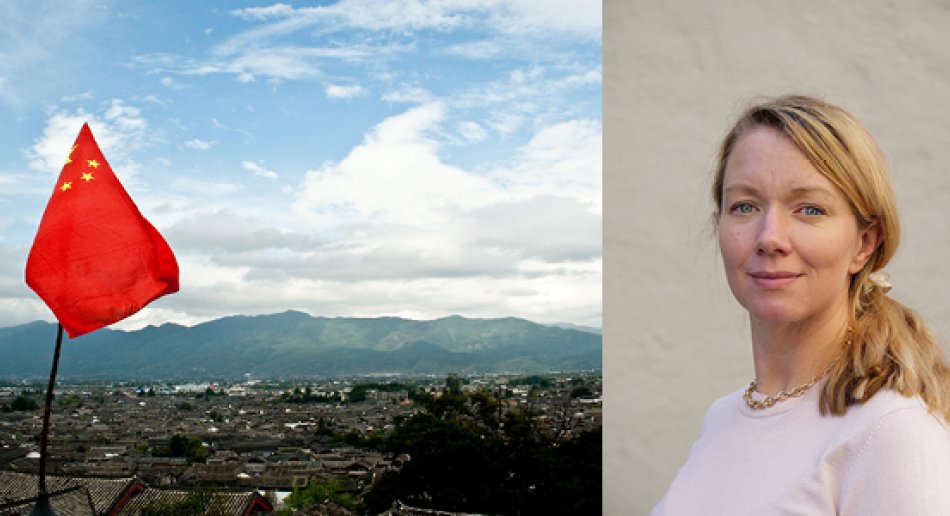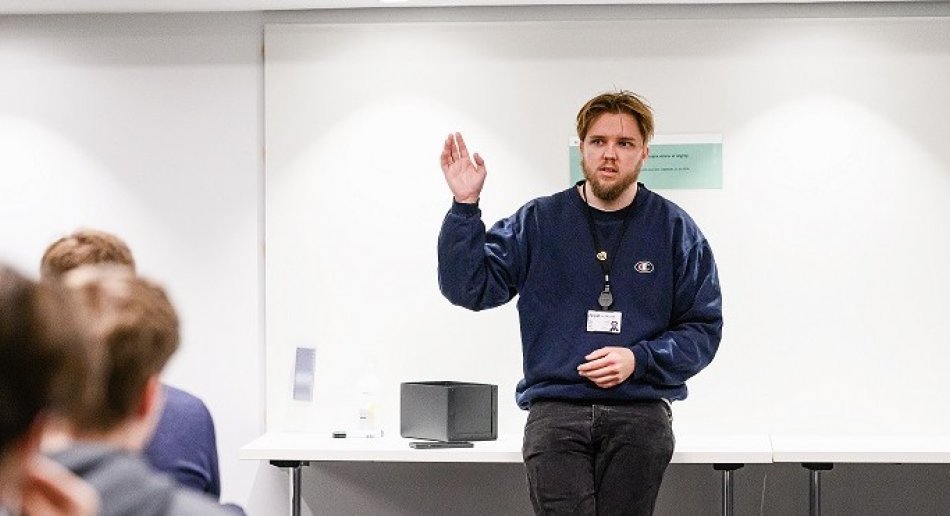
Master in Religion in Contemporary Society
Studieinfo
- Studiested: Majorstuen
- Progresjon: Heltid
- Varighet: 2 år
- Studiepoeng: 120
- Undervisningsspråk: Engelsk
- No longer open for application.
Master in Religion in Contemporary Society tar ikke lenger opp nye studenter fra våren 2026.
Vil du vite mer om hvordan religion og samfunn påvirker hverandre?
Masterprogrammet Religion in Contemporary Society er flerfaglig, med tyngdepunkt i samfunnsfaglige perspektiver.
Du får redskaper til å forstå og fortolke aktuelle samfunnsprosesser og samfunnsutfordringer som former, og formes av, religiøse tradisjoner og praksiser.
Som student vil du møte spørsmål som dette:
- Hvordan og hvorfor blir religion mobilisert i politiske konflikter i dag?
- Hva er egentlig «religion»? Er det et nyttig begrep?
- Hvordan kommer globale endringer til uttrykk i lokale religiøse praksiser?
- Hvordan kan vi best forstå at mange føler tilhørighet til religiøse tradisjoner de ikke tror på eller er aktive i?
Undervisningen foregår på engelsk. Alle skriftlige oppgaver, inkludert eksamen og masteroppgave, kan også skrives på norsk eller andre skandinaviske språk.
Lurer du på hva du kan bruke en samfunnsvitenskapelig utdannelse til?
Her kan du lese mer om mulige karriereveier.
Om studiet
Søknad og opptakskrav
Vi tar imot nye studenter hver høst.
Du søker om opptak gjennom Søknadsweb. Søknadsfristen er 15. april. Denne fristen gjelder for søkere med norsk statsborgerskap og statsborgerskap/permanent oppholdstillatelse i Norge/EU/EØS, samt for øvrige søkere med bachelorgrad fra norsk høyskole eller universitet.
Dersom det er ledige studieplasser, vil det være mulig å søke på disse frem til 15. august.
All dokumentasjon må være lastet opp i Søknadsweb innen søknadsfristen.
Eventuell innpassing av tidligere studier fra MF eller fra andre institusjoner gjøres etter opptak.
Opptakskrav
- Bachelorgrad eller tilsvarende utdanning av minst 180 studiepoengs omfang
- En kombinasjon av relevante emner innenfor religionsvitenskap* og samfunnsvitenskap**. Du må ha minst 80 studiepoeng innenfor det ene fagområdet og minst 20 studiepoeng innenfor det andre fagområdet
- Karaktergjennomsnittet i fordypningsenheten (80 stp.) må være C (eventuelt 2,7) eller bedre
*Med «relevante emner innenfor religionsvitenskap» menes emner som omhandler studiet av religion som kulturelt og historisk fenomen utforsket innen felt som religionsvitenskap, religionshistorie, religionssosiologi og religionsantropologi. Andre akademiske studier av religion, som teologi og tverrfaglige studier av religion kan også være aktuelle, og vurderes individuelt.
**Med «relevante emner innenfor samfunnsvitenskap» menes emner som omhandler studier i kvalitative samfunns- og kulturstudier, som sosiologi, antropologi, menneske-/kulturgeografi og politikk. Andre studier som gir ferdigheter til å arbeide med empiriske metoder og samfunnsanalyse kan være aktuelle og vurderes individuelt. Disse kan omfatte studier innen humaniora (utdanning/pedagogikk), medievitenskap, historie, idéhistorie og filosofi. Studier med vekt på kvantitative metoder, som økonomi og psykologi, kan også være aktuelle.
Oppbygning
| ||||||||||||||||
Beskrivelse av programmet
The MA in Religion in Contemporary Society: Public Issues - Global Perspectives provides knowledge about religion in contemporary society, from the perspectives of social science, the humanities and different kinds of religious studies. There is an emphasis on social science perspectives.
Religion in contemporary society is understood as interpretations of religious traditions, how religion is expressed in practice, and the interplay between religion and ongoing societal processes at the local, national and global scale.
The study programme provides in-depth study of recent theories of religion in contemporary society. There is an emphasis on methods from the sociology of religion and qualitative empirical studies of contemporary religion. The programme gives tools to understand and interpret relevant social processes and societal challenges that shape, and are shaped by religious traditions and practices. The study programme provides both analytical skills and practical skills to study and discuss religion using methods from social science.
The MA thus combines a broad introduction to social scientific methods and ways of thinking with perspectives from the humanities and the study of religion. There is an emphasis on the social scientific study of the role of religion, ideology and values in (post)modern societies in different parts of the world in our times. This equips students to discuss relevant societal challenges, including themes such as religion and politics, globalisation, climate change and migration. Elective courses provide the opportunity to focus on a specific topic, and give the education a unique profile suited for specific career interests or academic interests.
Compulsory courses and elective courses during the first year will enable the student to do an independent piece of research which will be presented in the form of a master's thesis in the second year. The thesis shall shed light on religion in contemporary society and the interplay between religion and society locally, nationally or globally. The coursework will train the students for doing empirical research and writing about it, but the students may choose to write a theoretical thesis as well.
As a main rule, 40 ECTS at the master level, including the course in methodology, must be completed before students can register for the master's thesis.
As a main rule, all courses in the programme must be completed before the thesis can be submitted.
The MA is open for students from the whole world, and the teaching is in English. All written work, including exams and dissertation, can be written in English, Norwegian or other Scandinavian languages.
Relevance of the Study Programme
Knowledge about religion and the role of religion in society is necessary and in demand in a range of societal domains. This master's programme will provide students with this kind of knowledge about religion and society, and help them develop the ability to think independently and critically. It will also equip the student with the ability to work with relevant questions of religion and society in a methodically rigorous way, locally as well as nationally and globally.
The programme is relevant for work where there is a demand for knowledge about the interplay between religion and society, and about how religion shapes and is shaped by contemporary social processes and societal challenges. The programme is relevant for positions in Norwegian and international institutions and organisations within the public, private and voluntary sectors.
The programme qualifies students for positions within research and education, including further studies at the PhD level.
Læringsutbytte
KNOWLEDGE
The student shall:
- have advanced knowledge about different forms of religion in contemporary society and the interplay between religion and society.
- have advanced knowledge about theories of contemporary religion from the social sciences, the humanities and religion studies.
- have advanced knowledge about research methods from the sociology of religion.
- have good knowledge about how religion can be understood and studies from different social science and humanistic perspectives.
- have good knowledge of questions concerning the philosophy of science of the study of religion.
SKILLS
The student shall:
- have experience with, and the ability to, conduct an independent research project.
- have the ability to communicate knowledge and perspectives on religion in contemporary society to people from different academic disciplines and in ongoing public debates.
- be able to use theoretical knowledge in different work situations.
- be able to work methodically and discuss relevant experiences from the perspective of a researcher on religion.
GENERAL COMPETENCIES
The student shall:
- be able to stay up-to-date with research literature and apply new knowledge to relevant problems and societal challenges.
- be enabled for work within different roles in the public, private and voluntary sectors.
- have the necessary academic skills to communicate social scientific insights in a critical and reflective way to people coming from other academic traditions, and in a way relevant to challenges that face contemporary societies.
- be able to conduct further research in an ethically responsible way.
Qualification after completing the program: Master of Philosophy in Religion in Contemporary Society: Public Issues - Global Perspectives
Utveksling
MF has exchange agreements with several partner universities. Read more about exchange opportunities on this page.
Be sure to plan and apply for the exchange well in advance in order to secure a spot.
MF recommends that students that wish to do an exchange do so in their second semester. Applying for an exchange in the first semester is reserved for students already accepted to one of MFs other study programmes.



